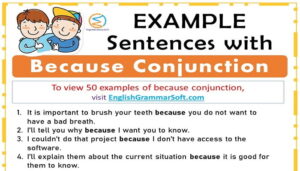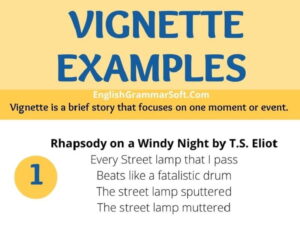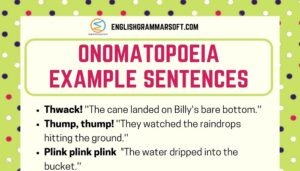What are Simple Sentences in English? (Examples & Types)
When first learning to write in English, it is often best to keep your sentences short and sweet. Once you practice more, you can start adding detail and complexity to your writing. But no matter how complex your sentences become, remember that they all start with a simple sentence!
Simple sentences are important in communication because they are easy to understand. They can be used to communicate basic information quickly and effectively. Simple sentences are also helpful when trying to make a point or giving instructions. When you use simple sentences, people are likelier to listen to what you have to say and less likely to get confused.
What are Simple Sentences?
A simple sentence is a sentence that has one independent clause and no dependent clauses. An independent clause is a group of words with a subject and a verb and can stand alone as a complete thought. A dependent clause is a group of words with a subject and a verb but cannot stand alone as a complete thought.
Simple sentences can be identified by a subject and a verb.
“I” is the subject and “eat” is the verb in this sentence:
I eat pizza.
Simple sentences are often written in the following format:
Subject + Verb + Object
The following examples show simple sentences with different types of objects:
- Subject + Verb + Thing that is acted on by the verb (object)
- I throw my ball. (ball is the object)
- Subject + Verb + Place where something happens (object)
- My brother lives in California. (California is the object)
How to Form Simple Sentences
Simple sentences are the most basic sentence structure. They are made up of a subject and a verb. The subject is usually a noun or pronoun, and the verb can be any form of to be or to do.
Some simple sentences contains only one clause, but more complex sentences contain more than one clause.
- Subject + Verb + Object
Here are some examples of simple sentences with a subject (S), verb (V) and object (O):
- I (S) am(V) tired(O).
- It (S) rained(V) yesterday morning(O).
Types of Simples Sentences
There are two types of simple sentences
Declarative Simple Sentences
Declarative simple sentences only have one clause, or part of the sentence. The subject of the clause is the noun or pronoun that performs the action expressed by the verb. The predicate consists of everything else in the sentence, including any objects or modifiers. The subject of a declarative simple sentence can be expressed in two ways: as an independent subject before the verb or as a subjective complement following it.
Examples
- I am going to school today.
- The dog barks at strangers who walk by our house at night.
Interrogative Simple Sentences
Interrogative sentences are used to ask a question. They are usually introduced by a question word like what, when, where, who, how and why.
Interrogative simple sentences consist of interrogative words followed by a subject and a verb in the base form. They are used to ask questions.
Examples
- Who is going there?
- What happened?
- Where did you go?
- Is she a doctor?
Why Do We Use Simple Sentences?
Simple sentences are an important part of writing because they can help to clear up any confusion or ambiguity that might exist in a longer, more complex sentence. Additionally, they can be easier for readers to understand and follow.
Simple sentences can be used for making statements about things in the world, or for describing a person’s feelings or thoughts. They can also be used to ask questions about things in the world or about people’s feelings and thoughts.
Simple Sentences 10 Examples
Some examples of simple sentences include the following:
- He always forgets his keys.
- Mr. Brown is our teacher.
- Emily is from Canada.
- She likes to read books.
- I have two sisters and one brother.
- My mother is a nurse.
- I am going to the store.
- She likes to play tennis.
- The wind is blowing.
- We will go to the park later.
As you can see, each of these sentences has only one independent clause and therefore can stand alone as a complete thought. Keep in mind that a simple sentence can also have compound subjects and compound verbs, as long as it only has one independent clause. For example:
– Both John and Jane are going to the store.
– She likes to play tennis and swim.
– He is a doctor and a professor.
These are all still considered simple sentences because they only have one independent clause.
However, keep in mind that not all sentences that are only one clause long are considered simple sentences. For example, the following sentence is not a simple sentence because it includes a subordinate clause:
-I am going to the store.
-They are playing in the park.
-He is reading a book.
-We are having a party.
-You are being very noisy.
-She is cooking dinner.
-It is raining outside.
-The sun is shining.
Simple Sentences Without Verb
All sentences do require a verb, but we often use informal speech in everyday life. Idioms and proverbs sometimes lack verbs. We consider some things acceptable to say when they are incomplete or lacking a verb because it sounds too common for us to point it out. Such sentences may be grammatically incomplete. Here are some examples.
- What a sunny day!
- What nonsense!
- Yes, please.
- What a beauty!
- Great work!
- The last conclusion.
- Yes, this one too.
- Of course, yes.
- No doubt.
- The softer, the better.
Simple Sentences Using Have
- You have a brother.
- Do you have parrots in your house?
- I have a couple of books.
- We have two cats and a dog.
- They have been to Paris.
- They have a good time.
- Have you backache?
- I have a good collection of shirts.
- We have a question.
- You have four bikes and a car.
Simple Sentence Using Word ‘Like’
- She acts like her mother.
- He works like a machine.
- He talks like an old man.
- I like sushi.
- I don’t like spinach.
- I would like to hear from you.
- She likes dogs, but she doesn’t like cats.
- I like to read books.
- We like to go on holiday to Spain.
- Do you like to play football?
Simple Do and Does Sentences Examples
- He does not like to study.
- She does not eat vegetables.
- We do not play football.
- You do not speak French very well.
- She does not like apples.
- Do you work on Sundays?
- Does she watch TV daily?
- I do my duty vigilantly.
- The cat does run.
- We do not like ice cream.
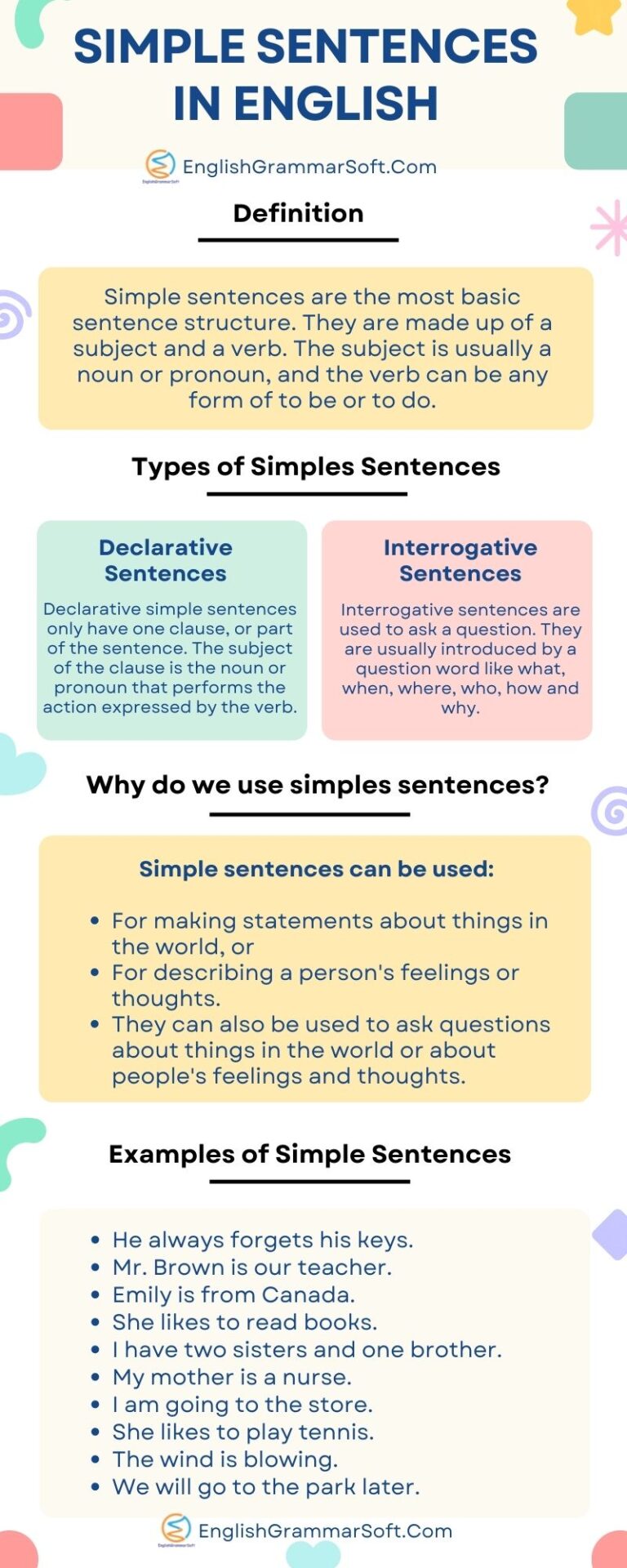
Further Reading
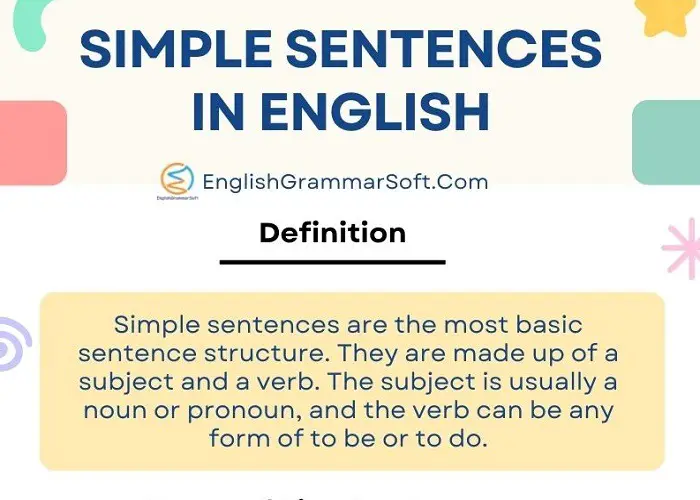
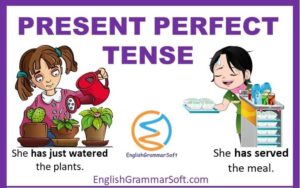
![Worksheet for Past Perfect Tense [with Answers]](https://englishgrammarsoft.com/wp-content/uploads/2021/05/Worksheet-for-Past-Perfect-Tense-Copy-300x203.jpg)
